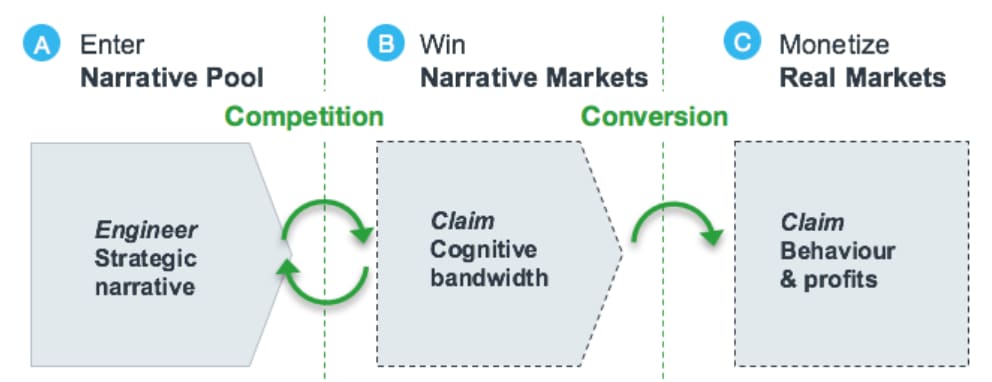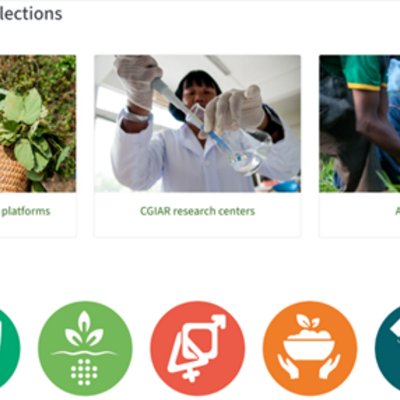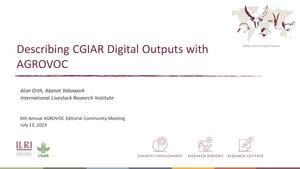
Win in old ‘real-world’ markets by capturing mind shares (claiming bandwidth) in the new ‘narrative markets’
[C]ompeting successfully in ‘old’ markets for capital, labour, goods and services no longer suffices. Firms, governments and other actors are compelled to create, contend and collaborate in new markets with distinct features and operating rules—markets for narratives.
‘. . . Behavioural economists . . . Daniel Kahnemann and Richard Thaler . . . argued that our analytical “slow brain” often turns to our intuitive “fast brain” for help. Heuristics or mental shortcuts take over when too little information or too much complexity compromise our rational calculus. But narratives are more than mental shortcuts for the real world—they increasingly are the real world.
‘Corporate narratives generate demand, attract top talent and, whether in banking or biotechnology, help secure a licence to operate. In economies, they inspire us to spend and start businesses, or impel us to sit tight, curtail outgoings and reduce risk. And yet, we know relatively little about how organizations compete for their narratives to be heard. This is a contest that increasingly determines success in “old” real markets, as well as in political and civil arenas.
‘A new strategy paradigm is called for.
Winning in old markets for capital, goods and services depends increasingly on competing successfully in new markets for narratives. Old markets organize the efficient allocation of real-world scarcity. New markets organize mental-world scarcity—the limited cognitive and affective resources that shape our behaviours and preferences.
‘Both are distinct yet tightly linked. Actors compete in narrative markets to secure claims on cognitive and affective bandwidth from consumers, investors or governments, which is then monetized in old markets.

‘Corporate giants such as Alibaba and Amazon fight not only over retail or fintech market shares, but over mind shares in the public debate about how technology serves humanity. Simplifying Amazon’s narrative is about translating an ultra-efficient, data-optimized pipeline into customer value through cheaper prices. Alibaba’s narrative is about a platform where small and medium enterprises gain market access, and about expanding aggregate supply and employment.
In places such as India or Singapore where Amazon and Alibaba compete head-to-head, the battle for customers, suppliers and regulators will unfold as much in the market for narratives as in actual electronic marketplaces. . . .
[N]arratives are categorically different from stories. Stories are self-contained, whereas narratives are open-ended. Stories are subjective accounts of other people’s decisions, while narratives are about us.
‘. . . The term [cloud computing] was coined in 1996 by NetCentric, which, like other cloud pioneers such as Sun Microsystems, failed as a business. Only when then-CEO of Google Eric Schmidt introduced the term to an industry conference did the idea take off. Soon, Microsoft, IBM, Amazon, Alibaba and others joined in the narrative, leading to the emergence of a new industry ecosystem with vast implications for organizations and real markets. The evolution of the cloud narrative demonstrates that for narratives to scale, leaders must become champions in shaping them.
‘. . . At a time when worn social, economic and political narratives are falling apart, the race for new narratives is greater than ever. From securing a licence to operate in foreign markets to tapping into the purchasing power of millennials, to building trust in emerging technological domains such as big data, AI, autonomous vehicles and biotechnology, successful narratives are key. Strategy at the highest level is about shaping narratives and the markets where they compete.’
In an information society, mental resources are scarcer, and hence more valuable, than material ones. . . .
Narratives come first; the rest of strategy follows.
Read the whole article by Tomas Casas Klett and Sebastian Buckup, Why today’s leaders need to know about the power of narratives, World Economic Forum, 4 Jul 2018.


















